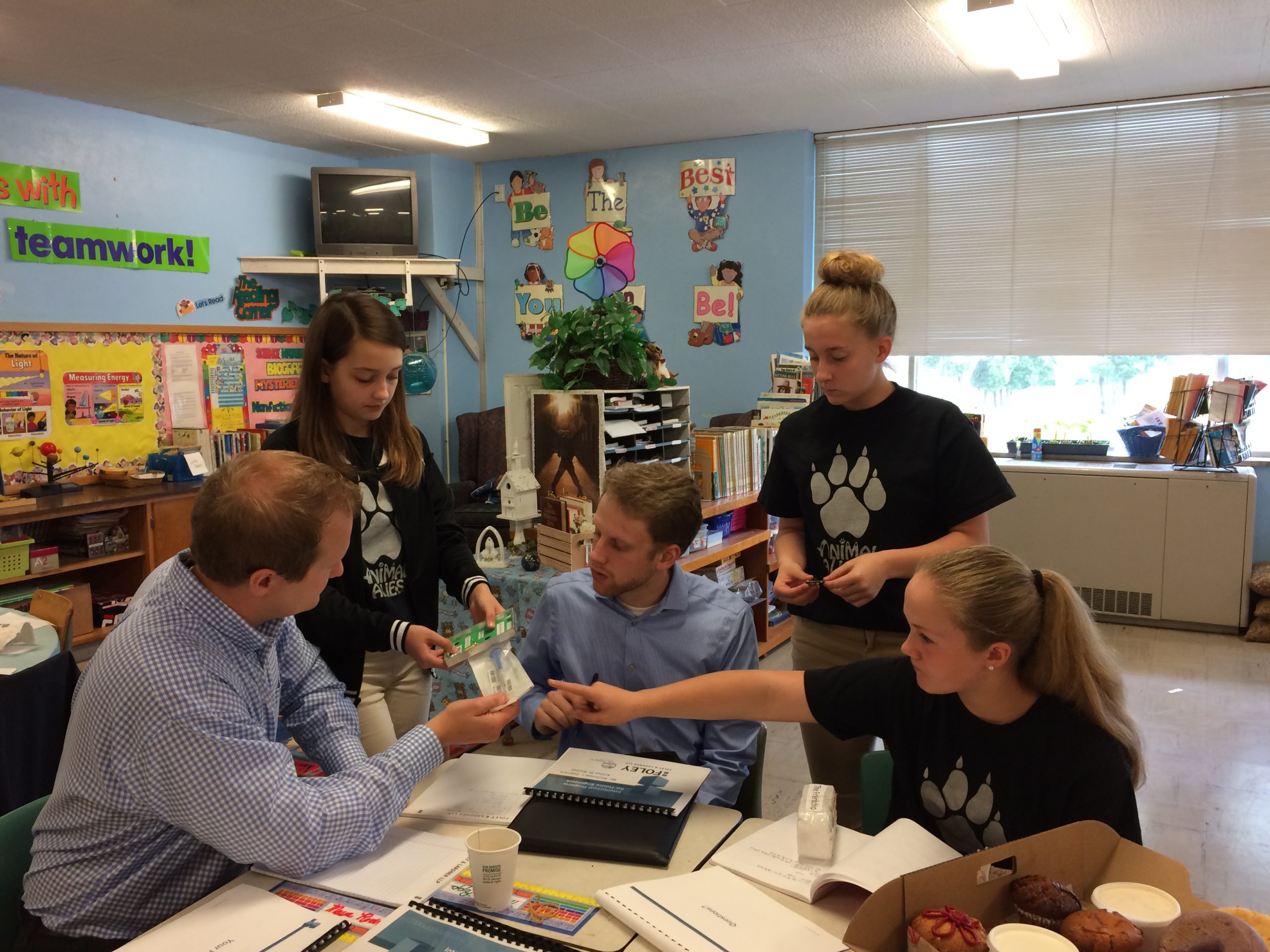
Former St. Peter Middle School students meet with patent attorneys from Foley and Lardner. (Submitted photo)
After a lengthy process, former St. Peter Middle School students secured a patent for their 2016 school project, “The Friendchip.” The product, created by the school’s “Brickbusters” robotics team, is a microchip programmed to assist pets in communicating with their owners.
The idea for the project developed in August 2016 when students brainstormed ideas to develop an invention that would help animals and people for the First Lego League Animal Allies Challenge of the year.
Team members included Hannah Schulgen, Avonna Niegelsen, Sarah Scanlan, Olivia Sween, (veteran members) Lucy Schrieber, Mary Schieber, Brietta Coen and Aidan Coen.
While developing their idea, the students participated in extensive community volunteer work and met three times a week to develop the microchip. They traveled to Marquette University to meet with biomedical engineering students to learn how to research and visited MSOE to learn about soldering circuit boards. They visited an animal sanctuary to study animals and prosthetics, and Lakeland Animal Shelter about the veterinary needs of the animals in the shelter. They also interviewed Dr. Bob Korman, Milwaukee County Zoo veterinarian, to understand the challenges of working with larger animals and toured Lake Geneva Animal Hospital to learn about small animal needs and challenges.
Following the animal research, the students visited the Nano Lab at UW-Madison to grasp the concept of microchips’ minute parts and learn how to create a product to monitor animal health systems and send updates to veterinarians from pet owners’ homes.
After the chip — which can sense temperature, blood sugar and movement — was completed, the team participated in several competitions, ultimately placing in the top three of 32,000 teams in the St. Louis World Lego League Tournament.
Realizing they were on to something, the team wanted to pursue a patent and reached out to Nicholas Zepnick, a patent attorney with Foley and Lardner, LLP. After Zepnick and his colleague Arthur Siebel met with students, they surprised students with a pro bono offer to help them secure the patent.
Mary Schrieber is grateful to have the patent, especially after she didn’t think the project would ever come to fruition. The East Troy High School senior attended St. Peter’s Parish School from pre-K through eighth grade. She was a member of St. Peter’s first Lego League team for many years, in addition to the 2017 patent team.
“Finally, being approved for this patent makes me and the rest of the Brickbuster team incredibly grateful and proud. After five years and two failed attempts, it was looking less and less likely that we would be able to call ourselves official inventors,” she said. “After the second denial, the team even considered retracting our application. When our amazing lawyers, Nick Zepnick and Arthur Siebel, reached out to us that our patent had gone through, we were completely ecstatic. I remember rushing to our team group chat as soon as I read the email and calling some of my teammates.”
Now that the patent is official, Schrieber explained that the team decided to motivate other students by advocating for other youth in STEM by sharing their story.
“Hopefully, our experience will inspire other young entrepreneurs to pursue their own ideas,” she said. “In regards to the patent itself, we plan to continue slowly sharing our invention with the professionals we meet at our respective universities while we all pursue our own education and careers. While we don’t have any specific goals for it, we hope that, someday, the networks we form will help us make our patent a reality.”
Olivia Sween is a senior at Mukwonago High School and was a part of First Lego League for four years. She said she learned that children are as capable as adults in changing the world and making their impact.
“The patent is a physical representation of resilience, creativity, hard work and the power of the adolescent mind,” Sween said. “I am so grateful to Foley for taking on this project on a pro bono basis and for continually supporting our team for the past five years of the process.”
The team has not decided what they plan to do with the patent but are in discussions to determine its future.
